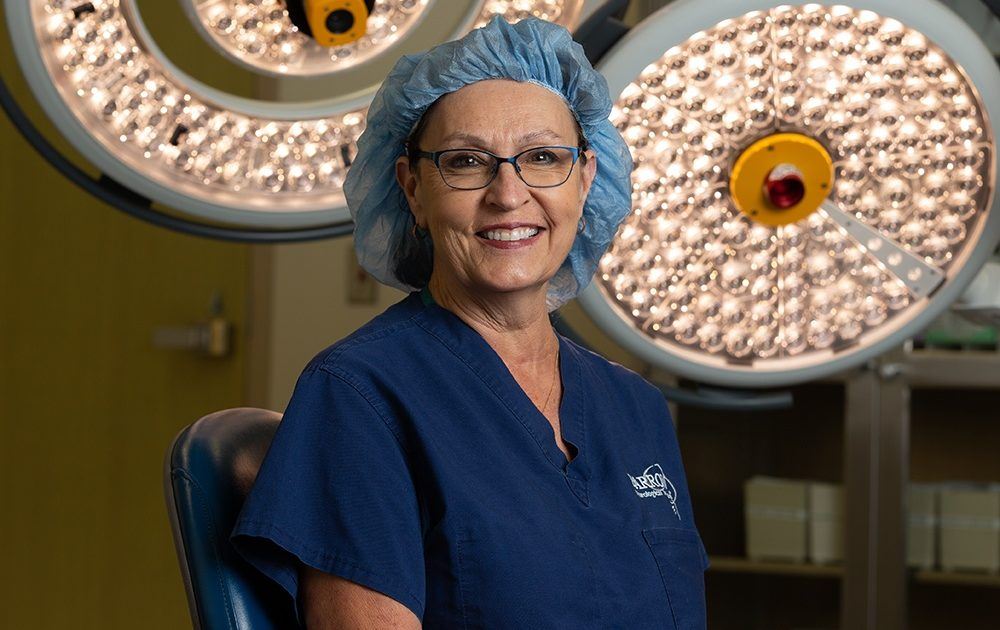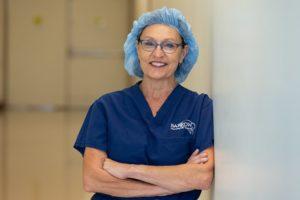
Meet Carol Blazier: Operating Room Nurse at Barrow
“People will ask me what I do, and I’ll say I’m a neurosurgery nurse,” she said. “They’ll say, ‘Oh my God; that must be exciting.’”
But Blazier explained that working as an operating room nurse is not adrenaline pumping every hour of every day, like some television shows make it out to be.
It does, however, keep her challenged after four decades in the field.
Becoming a Neurosurgery Nurse
Blazier began her nursing career in the 1970s on a surgical floor, where she cared for patients preparing for and recovering from various types of surgeries.
“That was the best thing I could do, as a very young and inexperienced nurse, to round myself out,” she said.
After a year in that role, she started working as an operating room nurse in general surgery. She scrubbed and circulated all kinds of procedures, developing a special interest in cardiac surgery and then gravitating toward neurosurgery. The scrub nurse works with the surgeons, passing instruments, while the circulating nurse is largely responsible for direct patient care and monitoring the room.
The Illinois native joined the staff at Barrow Neurological Institute in 1983, after her husband’s job brought them to Phoenix, Arizona. She has been here ever since.
Blazier calls herself an “odd duck” because she works almost exclusively as a scrub nurse rather than a circulating nurse.
Today, many operating rooms have certified scrub technicians assigned to each case—meaning all OR nurses automatically circulate. At Barrow, nurses can perform either role. Blazier believes having experience in both roles makes for a better OR nurse overall.
Neurosurgery: A Nurse’s Perspective
In neurosurgery, nurses may only work on a couple of cases in a day because of their complexity. A cavernous malformation surgery, for example, can take five hours or more. In general surgery, an OR nurse may work on several cases a day.

“It’s just a different animal here,” she said.
Blazier prefers cerebrovascular assignments—such as cavernous malformations, aneurysms, and arteriovenous malformations—because she finds them especially challenging.
“I’ve been a nurse for so long, I like to be challenged,” she said. “When things change or there’s a complication in surgery, we have to alter our course. We can adjust very, very quickly or appropriately without panic.”
Working on such specialized cases means Blazier often works with the same team and has for many years.
“The surgeons I work with, I know a lot about their preferences,” she said. “The case just flows, very much like a dance or a ballet.”
Barrow President and CEO Dr. Michael Lawton, who specializes in cerebrovascular cases, echoed that sentiment.
“Carol has an uncanny ability to anticipate the neurosurgeon’s moves, understand his or her needs, and be there with the right instrument or suggestion,” he said. “When we operate together, we find this rhythm that is so connected that we almost don’t need to speak to each other.”
Scaling Peaks, Navigating Valleys
Blazier enjoys working with neurosurgery residents throughout their seven years of training. Barrow has one of the largest neurosurgery residency programs in the country and accepts four new neurosurgery residents each year.
“I love to see the residents when they come in as interns and grow into competent neurosurgeons,” she said.
But, with the joys of having a role in positive patient outcomes and working alongside talented neurosurgeons, Blazier wants aspiring nurses considering a career in the neurosurgery OR to know before getting into this role that it’s not for everyone. While all surgeries carry risks, the complications can be more devastating in neurosurgery. Understandably, she says this is the most difficult part of the job.
And during those times when a patient’s outcome is ultimately out of the surgical team’s control—like with a malignant brain tumor that cannot be fully removed and is likely to grow back – there is still a reward in the time that surgery can provide to patients and their loved ones.
“We’re still trying to do the best thing we can do for these people and maybe give them a little more time with their family or loved ones,” she said.
When faced with difficult operations, Dr. Lawton says having Blazier by his side inspires great comfort and confidence.
“She makes a difference,” he added.
